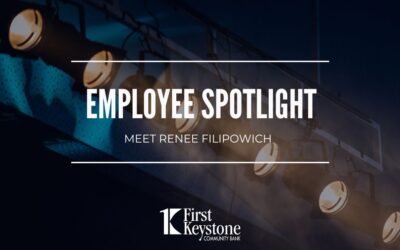It’s impossible not to notice that the housing market has taken off in a big way over the past couple of months. More houses are being listed for sale, with properties on the market for a matter of weeks or even days! Full price offers are not unusual and, in some cases, have led to overpriced properties and bidding wars. It’s a seller’s market, so if this is your first experience with buying a home, it’s even more important to enter the market fully aware of all of the possible expenses of owning a home.
The Dollars and Sense of Owning a Home
If this is your first time buying a home, the best place to start is with a “prequalification.” The term prequalification refers to an estimate for an amount of credit based on information you provide to a prospective lender. For example, once you receive a prequalification from First Keystone Community Bank, you’ll have a general idea of your maximum home price when searching on real estate websites. But before you go all in on that dream house, keep in mind the underlying expenses of owning a home. The initial price tag will not include ALL the costs you’ll incur.
Closing Costs and Down Payment
There will be a wide variety of closing costs involved in your purchase. Some are paid by you as the buyer and some are paid by the seller. Certain closing costs can be negotiated and discussed prior to signing a Sales Agreement. In most cases, you will also need to provide an amount of cash up front, known as your “down payment.” While there are mortgage options available that provide for a smaller down payment, you should plan on being able to cover at least 5% of the sale price as a down payment for conventional loans. Your Mortgage Loan Consultant can discuss the specific options available to you.
Home Inspections
For the protection of both buyer and seller, a home inspection by a professional provides a level of comfort that you will be getting what you paid for and there are no surprises or repairs waiting for you. Should an issue be uncovered during the inspection, a discussion with the seller may be necessary to work out the details as to who covers the cost of repairs.
Taxes
It is said that the only things that are certain in life are death and taxes and real estate taxes are some of the biggest taxes you will ever pay. You can discuss the option of paying taxes as part of your monthly mortgage payment. Known as “escrow,” this process allows you to spread the cost of the taxes (and insurance, in some cases) over the year, rather than paying the full amount in a lump sum. If you’d rather pay the taxes in one annual lump sum, you should consider saving throughout the year to help cover your costs. A great tool to help you save is a First Keystone All-Purpose Club. You can set your own schedule to save a certain amount on a weekly or monthly basis.
Insurance
Much like taxes, you have the option to escrow the cost of hazard insurance into your mortgage payment, but it should still be factored into the expenses of owning a home. Consult your insurance agent to see if you qualify for any discounts or if you would save money by bundling with your auto policy. This is a great time to contact other insurance companies to ensure you’re getting the best deal for your situation.
Utilities
One of the main reasons people purchase a new home is the opportunity to upgrade from an apartment to a house or from a small house to a larger house. But with more house comes higher utility bills. Going from 1,000 square feet of living space to 1,800 square feet of living space will cost more to heat and cool the home. Moving from well water to city water will create a water/sewer bill that you may not have had to deal with before. Before submitting an offer on a house, it’s a good idea to ask for an estimate of the monthly utility expenses so you can determine how they fit into your budget.
Updates/repairs
You finally found the house you want to buy. But before you can move in, there are things that need to be updated, which may be identified during a home inspection. Depending on how you negotiate the sales contract, you may be responsible for those updates. Or, let’s say one room still has shag carpet and wood paneled walls. You will have to pay someone for the renovations or purchase the supplies and renovate the room yourself. Home renovations tend to add up quickly! Make sure that you have the ability to cover those costs, as well as making your monthly mortgage and utility payments.
Rainy Day Fund
Ah, life is good. You just purchased your dream house using the maximum amount of borrowed funds from the bank and used your savings to kick in the down payment. Suddenly, your car needs a new transmission and your cell phone fell in a toilet and stopped working. There is a guy named Murphy who has some laws about these situations. At this critical time, make sure you don’t max out all of your options. Keep an emergency fund – preferably enough to cover several months of living expenses – because you never know when life will throw you a curve ball …. a curve ball that just went through the window of your new house, shattering the glass. Now your window needs a repair!
It’s crucial to make sure all the expenses of owning a home will fit into your current and projected budget and will match your lifestyle. Speaking of lifestyle, before you jump into owning a home, you should make sure that the home meets all the criteria on your wish list. Use this template from the U.S. Department of Housing as way to score the houses you look at to make sure you are making a good decision.
First Keystone has a dedicated team of Mortgage Loan Consultants to guide you through the process of purchasing a home, whether it’s your first time or your tenth time. Call 570-752-3671 x 1333 to talk with a Mortgage Loan Consultant today. You can also review the resources available through our online Mortgage Center. We are here for you when and where you need us!




